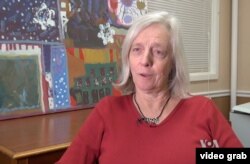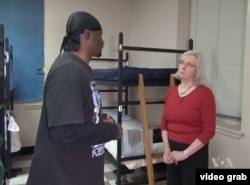As many homeless shelters across the U.S. remain at or near capacity, the country faces complicated challenges.
In his fiscal 2017 budget, President Obama proposed spending $11 billion over the next 10 years to fight family homelessness.
Gregory Talley used to sleep in a park, at an airport, or under a bridge. The 50-year-old has been homeless for more than 10 years.
"It is hard. It’s hard to live homeless. You filled every day trying to find out where you are going to get something to eat. If I hadn’t found wonderful Fairfax County Kennedy Shelter, I wouldn't know where I would be by now.I might be dead," Talley said.
The Kennedy Shelter is one of the facilities New Hope Housing provides for homeless families and individuals in the Washington suburbs.
Pam Michell has dedicated her life to making the lives of this vulnerable population better as executive director of the nonprofit organization.
Felt epiphany in Africa
“I went to Africa in 1985. And I saw an immense amount of poverty, but I saw so much hope. And I wondered what I was doing at home in my middle-class American life and decided that I should try to do something that would bring hope to people," Michell said.
"It is convenient, homelessness just happened to be what was around me. So I picked that,” she added.
When Michell began working with New Hope Housing 25 years ago, its three shelters had about 80 beds. Now, it has 350 beds and serves about 1,500 homeless people every year.
Michell has expanded the program beyond just providing beds for the night.
“We do outreach, we do prevention, we do permanent housing, we do transitional housing. We have an education program with all sorts of different things to move people to end their homelessness,” she said.
According to 2015 government data, more than a half-million people in the United States are homeless on any given night.
While the scarcity of affordable housing can be the main reason people experience homelessness, Michell said New Hope is offering them the services they need to change their lives and succeed.
Program to transform the homeless
"Our Out of Poverty program is not just about money," Michell said. "It's about you could be spiritually poor, you could be relationship poor ... you could be educationally poor. So it is focusing on how you get out of this poverty that has brought you to being homeless and find prosperity.”
The program tries to teach the shelter residents self-reliance and work values, and includes courses on planning and personal responsibility.
“I learned I still have opportunity to change it and I can change it," said shelter resident Lewis Webster. "It is just about going forth in doing necessary work to do it. I mean if you really want better, you would do better and that's the frame of mind of me now.”
Webster, who has spent time in jail, said he is confident he'll become a productive member of the community when he leaves the shelter and into a place of his own, in a month.








